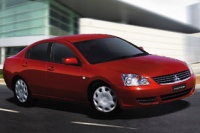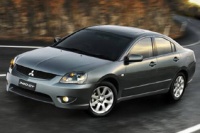Difference between revisions of "Mitsubishi 380"
Cartman02au (talk | contribs) |
Cartman02au (talk | contribs) |
||
| Line 14: | Line 14: | ||
The 380 went on sale on 13 October, 2005 in 5 [[Trim level|trim levels]]: | The 380 went on sale on 13 October, 2005 in 5 [[Trim level|trim levels]]: | ||
*380: The base model. Available in 5 speed automatic or 5 speed manual and comes with power windows, climate control and trip computer. Traction control and allloy wheels are an optional extra. | *380: The base model. Available in 5 speed automatic or 5 speed manual and comes with power windows, climate control and trip computer. Traction control and allloy wheels are an optional extra. | ||
| − | *380VRX: Sporty variant. Unfortunately unlike the [[ | + | *380VRX: Sporty variant. Unfortunately unlike the [[VR-X]] Magna, the 380VRX doesn't increase power, however like the [[:Category:First Generation Magna|First generation's]] [[Elante]] it has stiffer sports suspension. It features a different nose to the 380, alloy wheels, new rear taillights and a modest rear spoiler. Traction control is also standard. The only option is an electric sunroof. The 380VRX is available in both automatic and manual. |
*380LS: Affordable luxury. Appears to replace the [[Verada]], is similar to the early Ei Verada. It features 16" alloys, plusher interior fabrics, electrically adjustable driver's seat, premium sound, auto-dimming rear view mirrror, traction control and a small colour screen for displaying climate control and open door information. A 17" wheel and tyre package is optional. The LS looks like the base model externally with the addition of chrome highlighting here and there. The LS is only available in automatic. | *380LS: Affordable luxury. Appears to replace the [[Verada]], is similar to the early Ei Verada. It features 16" alloys, plusher interior fabrics, electrically adjustable driver's seat, premium sound, auto-dimming rear view mirrror, traction control and a small colour screen for displaying climate control and open door information. A 17" wheel and tyre package is optional. The LS looks like the base model externally with the addition of chrome highlighting here and there. The LS is only available in automatic. | ||
*380LX: Top of the line luxury. Similar to early Verada Xi. Features 17" alloys, full leather seats, electric front seats, revised suspension (same asa the VRX and GT), sunroof and wood look dash inserts. As with the LS it is automatic only. | *380LX: Top of the line luxury. Similar to early Verada Xi. Features 17" alloys, full leather seats, electric front seats, revised suspension (same asa the VRX and GT), sunroof and wood look dash inserts. As with the LS it is automatic only. | ||
Revision as of 01:29, 11 January 2010
The Mitsubishi 380 is the successor to the Magna/Verada line of vehicles. It has been said that the 380 will be the car that makes or breaks MMAL. If it fails, Mitsubishi will have to follow Nissan and become an importer-only in Australia.
Originally codenamed PS41, the 380 is based on the North-American 2003 model Mitsubishi Galant] and is similar in some regards. The 380 features different styling (departing from the Boulay crafted nose), a revised engine, revised suspension, larger brakes, different transmissions and a totally different method of construction. According to Lee Kernich there are around 2000 differences between the Australian 380 and the North-American Galant.
The new construction methods for the 380 required that Tonsley Park undergo it's largest upgrade in 40 years. The 380 is built using a new press which uses a single sheet of steel to make the sides of the car. Toy tab construction (where the car is tabbed together then welded) also contribute to the rigidity of the car. Mitsubishi claims that there is less than 0.7mm variation in it's bodies making it's panel fit superior.
The imported 6G75 engine is modified to comply with new lower emissions regulations to be introduced to Australia on 1 January, 2006. The revised 6G75 not only improves fuel economy and emissions but is also more powerful than the Galant's engine. The revised 6G75 uses the same camshafts as the Ralliart Magna.
The 380 is shorter than the Third Generation Magna/Verada but is has a roomier cabin than the Magna/Verada thanks to increases in wheelbase and width. The boot and fuel tank are smaller however. The 380 is also around 100 Kg heavier than it's predecessor.
Series I
The 380 went on sale on 13 October, 2005 in 5 trim levels:
- 380: The base model. Available in 5 speed automatic or 5 speed manual and comes with power windows, climate control and trip computer. Traction control and allloy wheels are an optional extra.
- 380VRX: Sporty variant. Unfortunately unlike the VR-X Magna, the 380VRX doesn't increase power, however like the First generation's Elante it has stiffer sports suspension. It features a different nose to the 380, alloy wheels, new rear taillights and a modest rear spoiler. Traction control is also standard. The only option is an electric sunroof. The 380VRX is available in both automatic and manual.
- 380LS: Affordable luxury. Appears to replace the Verada, is similar to the early Ei Verada. It features 16" alloys, plusher interior fabrics, electrically adjustable driver's seat, premium sound, auto-dimming rear view mirrror, traction control and a small colour screen for displaying climate control and open door information. A 17" wheel and tyre package is optional. The LS looks like the base model externally with the addition of chrome highlighting here and there. The LS is only available in automatic.
- 380LX: Top of the line luxury. Similar to early Verada Xi. Features 17" alloys, full leather seats, electric front seats, revised suspension (same asa the VRX and GT), sunroof and wood look dash inserts. As with the LS it is automatic only.
- 380GT: The top of the 380 range. A cross between the VRX and LX, featuring sporty looks with luxury. Externally it looks simlar to the 380VRX and inside it is totally different to the rest of the fleet. It features everything the 380VRX and 380LX do. Again, it is automatic only.
Series II
After just six months on sale and a failure to meet sales targets, MMAL released the 380 Series II in April, 2006. The Series II received a $6,500 drop in price (for the base model) and a re-jigged model line up.
- 380ES: Replaced the 380 as the base model of the range. Features remain the same.
- 380SX: All new variant. Meant to fill the gap left by the departure of the Magna Sports and VR. Available in both automatic and manual it adds 17-inch alloys, sports suspension with strut brace. Traction control, leather-wrapped steering wheel, gearshift knob and handbrake lever, sports seats, sports instrumentation, the same mesh grille as the VRX and fog lamps are also included as part of the package.
- 380VRX: Same as the 380VRX Series I ecept fo the addition of an auto-dimming mirror.
- 380LX: The automatic only 380LX Series II is a result of the combination of the two luxury models (LS/LX) in the Series I. Over the ES, the LX has 16 inch alloys; 10 way electric driver's seat; wood trim; leather upholstery; auto-dimming mirror; leather-wrapped steering wheel, gearshift knob and handbrake lever; traction control and six-disc CD/MP3 Player with eight speakers.
- 380GT: Same as the Series I variant.

